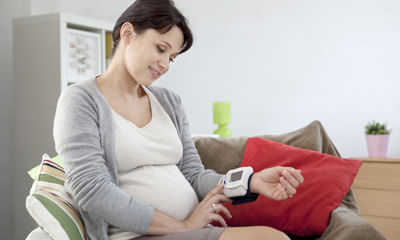Hypertension In Pregnancy
High blood pressure, or hypertension, is defined as blood pressure higher than 140/90 mm hg. Hypertensive disorders in pregnancy are a major cause of maternal, fetal and neonatal morbidity and mortality, both in developing and developed countries. Hypertension is the most common medical problem in pregnancy.
If high blood pressure continues after 20 weeks of pregnancy, preeclampsia and other complications can develop.
What causes high blood pressure during pregnancy?
According to the national heart, lung, and blood institute (nhlbi), there are several possible causes of high blood pressure during pregnancy.
These include:
- being overweight or obese
- failing to stay active
- smoking
- drinking alcohol
- first-time pregnancy
- a family history of pregnancy-related hypertension
- carrying more than one child
- assistive technology (such as ivf)
- maternal age is also a factor, with pregnant women over the age of 40 being more at risk.
BP measurement:
# use a sitting or semi-reclining position so that the arm to be used is at the level of the heart.
# do not take the bp in the upper arm with the woman on her side, as this will give falsely lower readings.
What are the complications of high blood pressure during pregnancy?
- if high blood pressure continues after 20 weeks of pregnancy, there can be complications. Preeclampsia can develop.
What is preeclampsia?
This condition can cause serious damage to your organs, including your brain and kidneys. Preeclampsia is also known as toxemia or pregnancy-induced hypertension. Preeclampsia with seizures becomes eclampsia. This can be fatal.
Thorough prenatal care, including regular doctor’s visits, should be able to address preeclampsia symptoms. Symptoms include:
@protein in a urine sample
Abnormal swelling in hands and feet
@persistent headaches
Preventing high blood pressure during pregnancy:
Common risk factors for high blood pressure, such as obesity and a history of high blood pressure, can be minimized through diet and exercise. Of course, during pregnancy, it is inevitable that you will gain some weight. It’s recommended that pregnant women consult with their doctor to identify a weight gain target that is healthy for them.
Dietary guidelines for pregnant women vary from person to person. Speak with a nutritionist who will keep your specific height and weight in mind when creating a nutrition plan for you.
The nhlbi emphasizes that it’s important to take steps to lessen your risk of high blood pressure. You should steer clear of smoking and drinking alcohol, both of which have been known to raise blood pressure.
Pregnancy causes hormone shifts, as well as psychological and physical changes. This can bring on stress, which can make high blood pressure harder to manage. Try stress reduction techniques such as yoga and meditation.
Management:
Management depends on the woman's bp, gestational age and blood flow in the placenta. Non-pharmacological management is recommended for many women but is not recommended when there is the presence of associated maternal and fetal risk factors. Non-pharmacological management includes close supervision, limitation of activities, and some bed rest in the left lateral position.
All pregnant women should receive antenatal education so that they are aware of the symptoms associated with pre-eclampsia, its importance, and the need to obtain medical advice.
Such symptoms include:
Severe headache.
Visual problems: blurred vision or flashing before the eyes.
Severe epigastric pain.
Vomiting.
Sudden swelling of the face, hands or feet.
Women who are at high risk of pre-eclampsia are recommended to take 75 mg aspirin daily from 12 weeks of gestation to delivery. Such women are those with:
- hypertension or pre-eclampsia/eclampsia in a past pregnancy.
- chronic kidney disease.
- autoimmune disease (eg, systemic lupus erythematosus (sle) or antiphospholipid syndrome).
- diabetes mellitus (both type 1 or 2).
- chronic hypertension.
Women should also take 75 mg aspirin daily from the 12th week if they have any two of the following features:- in their first pregnancy.
- aged ≥40 years.
- previous pregnancy >10 years ago.
- body mass index (bmi) of ≥35 kg/m2 at booking.
- family history of pre-eclampsia.
- multiple pregnancy.
Medication for high blood pressure during pregnancy:
Some traditional blood pressure medications can cause problems in pregnant women should be avoided when you are pregnant:
-ace inhibitors
-renin inhibitors
-angiotensin receptor blockers
These drugs in particular will be passed through the bloodstream to the developing baby. They can negatively impact the baby’s health. These medications may also cause blood to thin, which can compromise the mother’s ability to carry the baby to term.
Methyldopa and labetalol are both drugs that have been deemed safe for use to manage blood pressure during pregnancy.
Talk to your doctor about how to control your blood pressure if you develop hypertension during pregnancy.
Summary:
High blood pressure during pregnancy doesn’t usually lead to serious problems. However, if it goes untreated, hypertension can become life-threatening for both mother and baby.



+1.svg)
